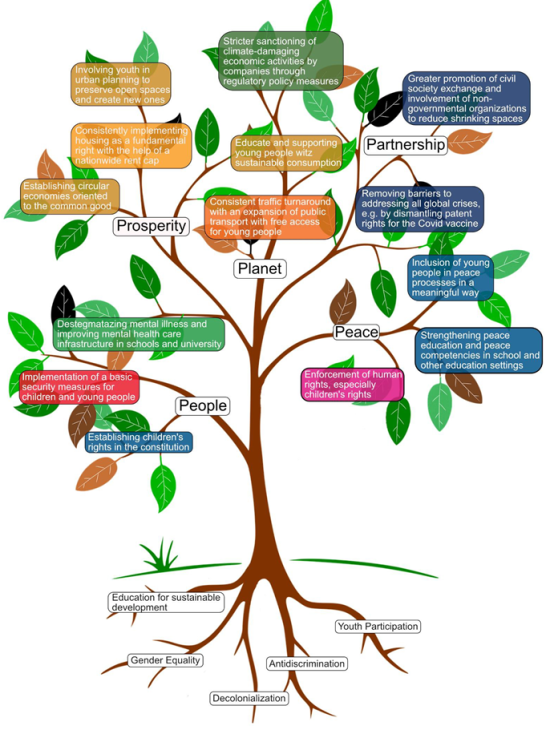Youth Perspective of the implantation of SDGs in Germany and on the international Level
The 2030 Agenda must become the guiding principle of German policy (PDF version)
VENRO, Association of German Development and Humanitarian AID Ngos
Statement on the occasion of the Voluntary National Review 2021.
Where did the ambition go? (PDF version)
German NGO Forum on Environment and Development
Youth Perspective of the implantation of SDGs in Germany and on the international Level (PDF version)
Youth Perspective of the implantation of SDGs in Germany and on the international Level
From now on, the international state community has nine years left to successfully implement the 2030 Agenda. Until now, neither Germany nor any other state is on track to fulfil the com- plete agenda with its 17 Sustainable Development Goals until 2030. Therefore, accelerated action is needed as well as the identification of key drivers and enablers for a sustainable development with, in and through Germany. This paper aims to present and to elaborate on identified cross-cutting themes that are crucial preconditions for a successful transformation on an international and national level. One of the most necessary defaults for a long-lasting sustainable development is high-quality education; accessible for everyone. This means that schools and other formal and non-formal educational institutions need to anchor Education for Sustainable Development (abbr.: ESD) structurally in their curricula and places of non-formal education, such as youth-led associations, must be strengthened financially and politically by providing the physical space to create learning locations. Education is key to raise knowledge about complex interrelations and helps to raise the social acceptance for eco-friendly policy measures. To ensure an educational accessibility for all, Germany must tackle its still existing inequalities between people with and without disabilities, between people with and without migration backgrounds and last but not least between all genders. Therefore, all gaps between genders must be eliminated, such as the pay gap or the digital gap, and a total equality of opportunities must become a standard in all spheres of life. This means to establish an overall feministic policy framework and to achieve empowerment of women and other genders in all areas of society; especially in women-based areas such as care work. In this context, there needs to be a better distribution between the genders. Existing inequalities within a country are the most toxic circumstance for any democracy; its consequence is an increasing right- wing populism as it is currently on the rise in many European countries. It is not uncommon for populist attitudes to develop into radical right-wing tendencies, often accompanied by racist or discriminatory attitudes. This doesn’t only increase the de facto social inequalities, but also the feeling of inferiority of the people affected by discrimination. Social cohesion gets endan- gered and a peaceful coexistence becomes a distant prospect. For this reason, Germany must take a clear stand: Racist and discriminatory hostilities must no longer be tolerated and need to be prosecuted more strongly under criminal law. In order to ensure an anti-racist and dis- crimination-free coexistence within society, educational units and trainings on the topic of anti- discrimination and prevention of radicalisation must get more financially supported by the state. Existing inequalities among different countries have emerged at the expense of the en- vironment and the exploitation of resources. To combat these inequalities, a solidary interna- tional cooperation on eye-level needs to be established. Aside from the re-evalutation of the patent protection laws this also a fully decolonized cooperation. A complete decolonization entails a remaining value creation in the producing country and socially and ecologically bind- ing due diligence. Especially when it comes to exporting countries from the global south. This duty of diligence must be strictly monitored and internationally sanctioned in the event of a violation. The last and most important key driver for a successful decade of action is the rise of meaningful and structural youth inclusion and participation, as the overall aim of the trans- formation is the recreation of justice between the generations. Young people must finally be understood as an integral part of the search for solutions. Including young people in consulta- tions ensures that the interests of future generations get considered in a significant way. Short- sighted decisions can therefore be avoided as younger generations have an intrinsic interest in living on a healthy and well-functioning planet.
Next to the elaborated cross-cutting key enablers for sustainable development, there do exist various other ideas and visions on how the SDGs can be quickly implemented among the five P’s of the 2030 Agenda:
 |


